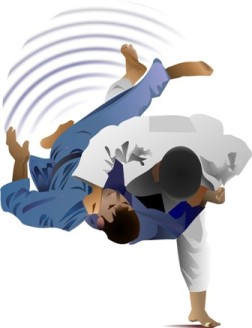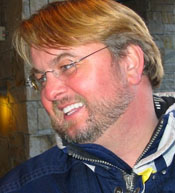January 2011 - Vol. 46  . .
.Judo, Wounds, and Hope by Sam Williamson A friend last week explained to me how Judo works. The key in Judo, he said, is to use the enemy’s force – his strength, balance and momentum – against him. So when the opponent lunges forward to kick or steps into a punch, you merely move aside and pull. And the momentum of the opponent – aided by the tiniest of pulls – throws him off balance. You redirect their strategy to bring their defeat. You use their own strength to bring about their demise. This is a great picture of how the Lord works on our behalf in the world and in our hearts. We have a God who doesn’t create the evil in this world, but he manages it, rearranges it, and redirects it so that the evil eventually destroys itself. In each of our lives we have received deep wounds:
And worse, many of these wounds are self-inflicted. We’ve done stupid things. We’ve missed opportunities. We’ve blown great friendships. And we think our life is over. We believe we are on Plan B. When – or if – we review our lives, don’t we occasionally wonder, “What possible good can come from that? Have I royally blown it? Are there ever any second chances?” We have a hope, and God has a pattern. The author JRR Tolkien says it best when Sam Gamgee exclaims, “Is everything sad going to come untrue?” This hope brings joy out of wounds and life out of weakness. Our hope is anchored in the very nature of God. Not only is Christ the Heavenly King and our Ultimate Love; he is the Master Judo Black Belt. Jesus our hope arranges that even the plans of the enemy bring about godly plans in our hearts and lives. He redirects the momentum of the enemy’s evil so we are never on Plan B. Most of us miss this important lesson. God is not merely in the business of restoring our former condition. He is not merely patching things up. He doesn’t just bring us back to ground zero. The Lord is concerned with victory – our own. Let us make no bones about it. God’s pattern of victory from defeat weaves itself throughout the scriptures. He takes a broken situation or a weak person or an evil event and he turns it into victory. Not a mere return to status quo. Victory. Below are two famous examples. Because they are well known, it is easy to gloss over them, but I encourage us to look into the despair of broken dreams and shattered lives and see his incredible life-giving hope. Joseph
But wait, it gets worse. Joseph’s brothers sell him into slavery and celebrate their windfall. As Joseph begins to mature, he finally acts righteously, rebuffing an abusive sexual advance. So what happens? When Joseph and his brothers act out of brokenness, things go bad. When Joseph acts out of righteousness, things get even worse. He is thrown in to prison – and history teaches us that these prisons were brutal beyond our nightmares. Out of this train wreck of a life, Joseph becomes Prime Minister of Egypt and he saves his father and brothers, and Egypt too. Not only are thousands of lives physically saved, Joseph’s heart is spiritually saved, and he says to his brothers, “you meant this for evil, but God meant it for good.” Can we see God’s Black Belt in Judo at work? There was woundedness and sin – the spoiling of Joseph, the neglect of his brothers, the selling into slavery, the sexual advance, and the wrongful accusation – and God uses the momentum of the enemy to bring about victory. He saves lives and he heals hearts. It is not merely a return to the things as normal. David
Imagine growing up as the youngest of seven boys, and imagine your father calling you the runt of the litter. There is a deep wounding, a gut-wrenching stab, and a sense of abandonment. There is a feeling of being completely unknown and misunderstood. There is the evil of neglectful parenting, horrible sibling relations, and complete isolation. And God, using his Ultimate Judo Black Belt, draws on the abandoned shepherd boy to defeat the giant enemy Goliath. If David had gone to the Israelite equivalent of a West Point military academy, he would have cowered with the rest of Saul’s army. Later, David writes a song in which he explains God’s strange and wonderful working though his pain and suffering. In Psalm 144 David sings, Blessed be the Lord, my rock.We have a God who doesn’t create the evil in this world, but he manages it, and redirects it so that the evil eventually destroys itself. And you
“Wow,” you say, “that was depressing!” Now, what can we do with these memories? God is moving heaven and earth to redirect these very evils to bring about a good in us and in this world. Someday, we, like Joseph, will be able to say, “The world meant it for evil, but God arranged it for good.” Someday, we, like David, will be able to sing, “Blessed be the Lord, he personally trained my heart and my hands and my fingers.” But how can we know he will bring victory? Today. How can we be certain in our hearts? How can we have the joy that comes with the hope of his promise? We can know this because of the wounds of Jesus. On the road to Emmaus, the disciples despair over the condemnation and crucifixion of Jesus, saying, “We had hoped he was the one to redeem Israel.” This was their darkest hour. Don’t we see? God let his beloved son enter into the brokenness and evil of the world, and he let his only son be unjustly lynched. But God rearranged that evil, and he redirected the condemnation and crucifixion, so that sin and death – through Christ – brought about their own destruction. Have you ever wondered why the risen body of Christ still has scars? Isn’t it weird? This is God at his most mysterious and powerful. He raises his son from death; he gives him a new glorious spiritual body; and that body still has wounds in its hands, feet, and side. And Jesus deliberately points out those scars to everyone he meets. His scars endlessly display the glory of the Father bringing victory out of defeat. His wounds become his glory. Not only is Christ not ashamed of them, his risen body will carry them for eternity. The wounds did not win. Rather, through them God rearranged evil to eventually destroy itself. His risen body is perfect and his risen body will show his wounds forever. Can we see the Master Black Belt in action? He takes the momentum of despair at Christ’s death and, with a tug, brings about the greatest delight in human history. In fact, part of his victory is turning things inside out and upside down, so that what we thought was our greatest wound becomes our great glory. Do we see this pattern in God? He doesn’t create the evil in the world, but he is so powerful, so brilliant, so loving, and so creative that he can rearrange the evil and suffering to bring about unimaginable good and beauty. He is the Ultimate Judo Black Belt. And he is alive, performing this miracle in us. Every day. Sometimes we see it, and sometimes we don’t. But we shall see it all, eventually. © Copyright 2010, Beliefs of the Heart, Ltd. All rights reserved.
|
. | |||
|
publishing address: Park Royal Business Centre, 9-17 Park Royal Road, Suite 108, London NW10 7LQ, United Kingdom email: living.bulwark@yahoo.com |
. |
